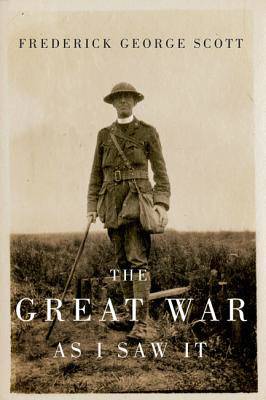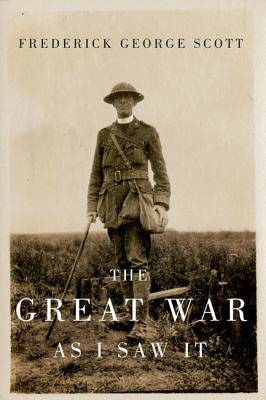
Door een staking bij bpost kan je online bestelling op dit moment iets langer onderweg zijn dan voorzien. Dringend iets nodig? Onze winkels ontvangen jou met open armen!
- Afhalen na 1 uur in een winkel met voorraad
- Gratis thuislevering in België vanaf € 30
- Ruim aanbod met 7 miljoen producten
Door een staking bij bpost kan je online bestelling op dit moment iets langer onderweg zijn dan voorzien. Dringend iets nodig? Onze winkels ontvangen jou met open armen!
- Afhalen na 1 uur in een winkel met voorraad
- Gratis thuislevering in België vanaf € 30
- Ruim aanbod met 7 miljoen producten
Zoeken
€ 177,45
+ 354 punten
Uitvoering
Omschrijving
A fifty-three-year-old Anglican priest and poet when the First World War broke out, Frederick George Scott was an improbable volunteer, but also an invaluable war memoirist about life at the front. Enlisting at the very beginning of the conflict and serving on the Western Front until the Armistice, Scott became the most decorated Canadian chaplain. A High Anglican and staunch British imperialist described by one of his fellow officers as "an old snob of the old school," Scott also defied stereotypes, often rejecting the privileges he was entitled to as an officer and insisting on being at the frontlines with the rank-and-file soldiers, with whom he felt genuine kinship. As a result, he was seriously wounded in the autumn of 1918, near the end of the war. The Great War as I Saw It is an idiosyncratic portrait by a man of strong religious convictions witnessing the horror of modern warfare. In evocative prose shaped by his background as a poet, Scott moves between lighthearted moments and dark tragedy, including his wrenching account of searching for his own son's body in a ruined battlefield. Rich in detail, it is one of the most diverse and complete first-hand accounts of the war ever published.
Specificaties
Betrokkenen
- Auteur(s):
- Uitgeverij:
Inhoud
- Aantal bladzijden:
- 376
- Taal:
- Engels
- Reeks:
- Reeksnummer:
- nr. 230
Eigenschappen
- Productcode (EAN):
- 9780773544246
- Verschijningsdatum:
- 15/11/2014
- Uitvoering:
- Hardcover
- Formaat:
- Genaaid
- Afmetingen:
- 152 mm x 229 mm
- Gewicht:
- 625 g

Alleen bij Standaard Boekhandel
+ 354 punten op je klantenkaart van Standaard Boekhandel
Beoordelingen
We publiceren alleen reviews die voldoen aan de voorwaarden voor reviews. Bekijk onze voorwaarden voor reviews.











